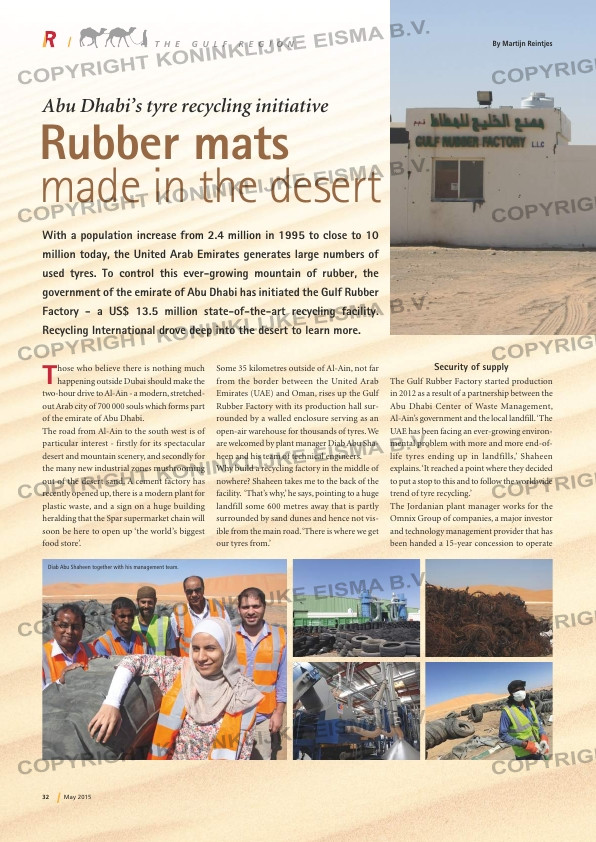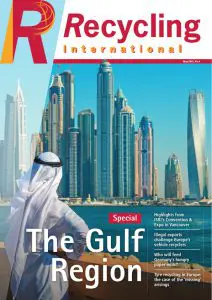Page 32 from: May 2015

With a population increase from 2.4 million in 1995 to close to 10
million today, the United Arab Emirates generates large numbers of
used tyres. To control this ever-growing mountain of rubber, the
government of the emirate of Abu Dhabi has initiated the Gulf Rubber
Factory – a US$ 13.5 million state-of-the-art recycling facility.
Recycling International drove deep into the desert to learn more.
Those who believe there is nothing much happening outside Dubai should make the
two-hour drive to Al-Ain – a modern, stretched-
out Arab city of 700 000 souls which forms part
of the emirate of Abu Dhabi.
The road from Al-Ain to the south west is of
particular interest – firstly for its spectacular
desert and mountain scenery, and secondly for
the many new industrial zones mushrooming
out of the desert sand. A cement factory has
recently opened up, there is a modern plant for
plastic waste, and a sign on a huge building
heralding that the Spar supermarket chain will
soon be here to open up ‘the world’s biggest
food store’.
Some 35 kilometres outside of Al-Ain, not far
from the border between the United Arab
Emirates (UAE) and Oman, rises up the Gulf
Rubber Factory with its production hall sur-
rounded by a walled enclosure serving as an
open-air warehouse for thousands of tyres. We
are welcomed by plant manager Diab Abu Sha-
heen and his team of technical engineers.
Why build a recycling factory in the middle of
nowhere? Shaheen takes me to the back of the
facility. ‘That’s why,’ he says, pointing to a huge
landfill some 600 metres away that is partly
surrounded by sand dunes and hence not vis-
ible from the main road. ‘There is where we get
our tyres from.’
Security of supply
The Gulf Rubber Factory started production
in 2012 as a result of a partnership between the
Abu Dhabi Center of Waste Management,
Al-Ain’s government and the local landfill. ‘The
UAE has been facing an ever-growing environ-
mental problem with more and more end-of-
life tyres ending up in landfills,’ Shaheen
explains. ‘It reached a point where they decided
to put a stop to this and to follow the worldwide
trend of tyre recycling.’
The Jordanian plant manager works for the
Omnix Group of companies, a major investor
and technology management provider that has
been handed a 15-year concession to operate
Diab Abu Shaheen together with his management team.
Rubber mats
made in the desert
Abu Dhabi’s tyre recycling initiative
T H E G U L F R E G I O N By Martijn Reintjes
32 May 2015
RI 4-ME_Rubber factory.indd 32 30-04-15 14:53



